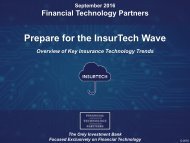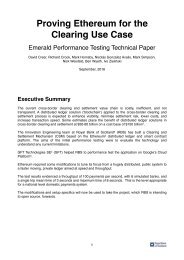Bitcoin and Cryptocurrency Technologies
1Qqc4BN
1Qqc4BN
You also want an ePaper? Increase the reach of your titles
YUMPU automatically turns print PDFs into web optimized ePapers that Google loves.
Still, if we could replace <strong>Bitcoin</strong> mining with a less energy‐intensive puzzle <strong>and</strong> still have a secure<br />
currency, this would be a positive change. We’ll see in Chapter 8, however, that we don’t know if<br />
that’s actually possible<br />
Repurposing energy. Another idea to make <strong>Bitcoin</strong> more eco‐friendly is to capture the heat generated<br />
from <strong>Bitcoin</strong> mining do something useful with it instead of just heating up the atmosphere. This model<br />
of capturing waste heat from computation is called the approach is called the data furnaceapproach.<br />
The concept is that instead of buying a traditional electric heater to heat your home, or to heat water<br />
in your home, you could buy a heater which doubled as a <strong>Bitcoin</strong> mining rig, mining bitcoins <strong>and</strong><br />
heating up your home as a byproduct of that computation. It turns out that the efficiency of doing this<br />
isn't much worse than buying an electric heater, <strong>and</strong> perhaps this would be no more complicated for a<br />
home consumer than plugging their heater into their Internet connection as well as their electricity<br />
outlet.<br />
There are a few drawbacks to this approach. Although it’s about as efficient as using an electric<br />
heater, electric heaters are themselves much less efficient than gas heaters. Besides, what happens<br />
when everybody turns off their <strong>Bitcoin</strong> mining rig during the summer (or at least everybody in the<br />
Northern Hemisphere)? Mining hash power might go down seasonally based on how much heat<br />
people need. It might even go down on days that happen to be warmer than average! This would<br />
caused many interesting effects for <strong>Bitcoin</strong> consensus if the data furnace model actually caught on.<br />
The question of ownership is also not clear. If you buy a <strong>Bitcoin</strong> data furnace, do you own the <strong>Bitcoin</strong><br />
mining rewards that you get, or does the company that sold them to you? Most people don't have<br />
any interest in <strong>Bitcoin</strong> mining — <strong>and</strong> probably never will — so it might make more sense to buy it as<br />
an appliance <strong>and</strong> have the company that sold it to you keep the rewards. This might mean the heater<br />
is sold at a slight loss then, in which case some enterprising users might want to buy them <strong>and</strong> modify<br />
them to keep the mining rewards for themselves, leading to a potentially ugly DRM (Digital Rights<br />
Management) battle.<br />
Turning electricity in cash. Another long‐term question posed by <strong>Bitcoin</strong> is that it might provide the<br />
most efficient means of turning electricity into cash. Imagine a world in which <strong>Bitcoin</strong> mining ASICs are<br />
a readily‐available commodity <strong>and</strong> the dominant cost of mining is electricity. In effect, this would<br />
mean providing free or low‐cost electricity is open to new forms of abuse.<br />
In many countries around the world, governments subsidize electricity, particularly industrial<br />
electricity. Among other reasons, they often do so to encourage industry to be located in their<br />
country. But <strong>Bitcoin</strong> provides a good way to turn electricity into cash, which might cause governments<br />
to rethink that model if their subsidized electricity is converted en masse to bitcoins. Electricity<br />
subsidies are intended to attract businesses that will contribute to the country’s economy <strong>and</strong> labor<br />
market <strong>and</strong> subsidizing <strong>Bitcoin</strong> mining may not have the intended effect.<br />
149









